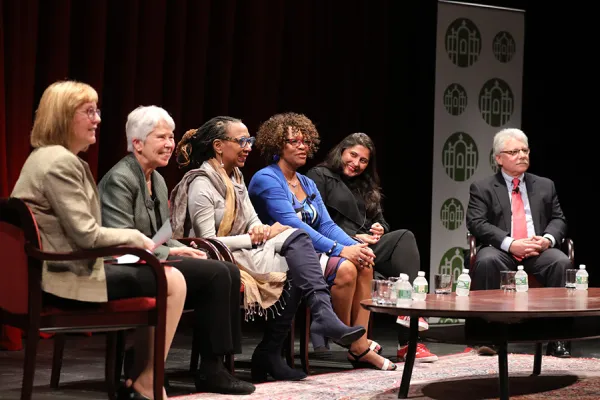On the Eve of Graduation: Advice from the Honorands
Campus Life

Published May 19, 2018
It was a great place to get great advice.
On the eve of graduation, Smith seniors joined families and friends in Theatre 14 for a thoughtful and inspiring conversation with this year’s honorary degree recipients.
In a discussion covering topics as wide ranging as art, #TimesUp and free speech on college campuses, the issues that seemed to matter the most were those related to transitions.
“Tell us about one of your new beginnings,” began President Kathleen McCartney, who moderated the panel.
President Emerita Carol Christ, who led Smith from 2002 to 2013, recalled the surprise of “flunking retirement” and, at age 73, becoming chancellor at the University of California Berkeley. “The narrative of your life is never over,” she said. “There are eye-opening turns at every arc. It helps to be open to the unexpected.”
For Sharmeen Obaid-Chinoy ’02, the events of September 11, 2001 inspired a last-minute career change just months before her January graduation. En route to an appointment on campus, the economics and political science major realized that her plan was no longer her passion. “Do I really want to spend my career going to meetings,” she thought, “or do I want to tell stories from my part of the world? Because my part of the world is about to change.” A Google search for “visual journalism” — followed by dozens of emails to people she didn’t know (including, eventually, the president of The New York Times) led to a career in filmmaking—and multiple Academy Awards.
I spent my entire 20s working much too hard. So to my 22-year-old self I’d say, ‘Have more fun’
Pulitzer Prize-winning poet Rita Dove, who will deliver Sunday’s Commencement address, recalled “rebuilding a life” after her house was struck by lightning. A week after the incident, which destroyed much of her family’s belongings—including her poetry notebooks—she was invited to unwind at a dinner dance with some of her neighbors. “So the first article of clothing I bought after the fire was a ball gown,” she said. The evening was transformative: Afterwards, “I forgot about poetry for a while and learned to dance,” she said. “And then one day a poem came out about dancing.”
From the audience, a question: “What would you tell your 22-year-old self?”
Said Christ, “You’re moving from a place where your main task is to fulfill assignments from adult authorities to making choices about the shape of the life you want to live. Don’t be afraid to be adventurous.”
Obaid-Chinoy, who will soon turn 40, agreed. “I spent my entire 20s working much too hard,” she laughed. “So to my 22-year-old self I’d say, ‘Have more fun.’”
Kimberlé Williams Crenshaw, whose groundbreaking work on intersectionality has reshaped understandings of power and society, said, “Don’t be as doubtful as you might be about the lack of precedent. I’m glad I was blissfully ignorant that what I was doing was different from what everyone else was doing.”
Robert Pura, retiring this year after nearly two decades as president of Greenfield Community College, recalled his dad, who confided, shortly before his death, “Your mother was wrong. They don’t weigh you on the way out. I should’ve eaten more ice cream.”
In the end, the conversation turned from advice for grads to advice for Smith.
“This is an extraordinary time,” said Crenshaw. “This is not a business-as-usual moment. I see Smith as a place that plays forward what it has always done in other extraordinary times—to create discourse and leadership so that Smith graduates can address the times that we live in.”
Pura applauded Smith and other institutions that have been leaders on issues of access to higher education. “The future of democracy is about access to higher education,” he said.
Christ noted, “The most important thing colleges can do is give students a confidence in their voice and their agency, to let students know that one person—groups of people—can make a difference. Smith does that.”